What's wrong with Obama's 'no-terrorist' gun ban?
- Published
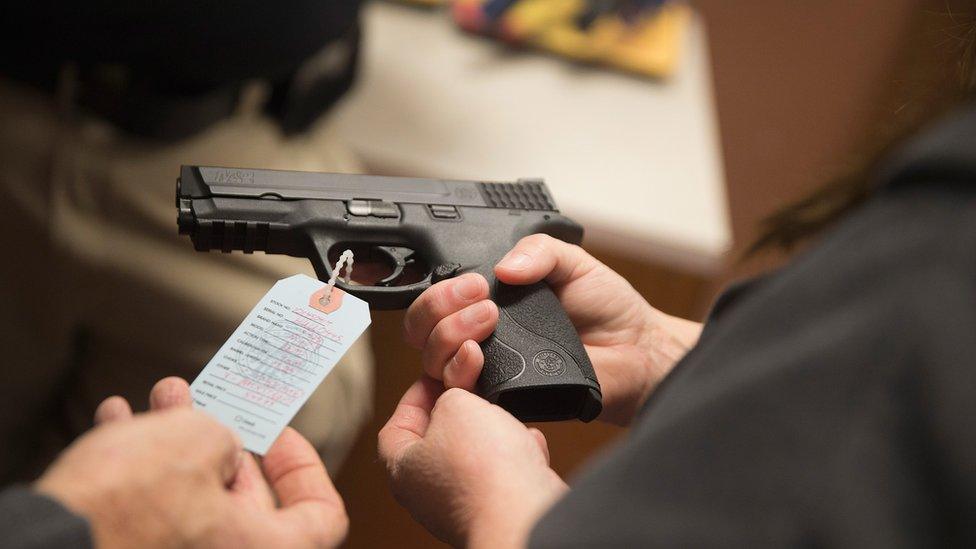
When President Barack Obama suggested using the federal "no-fly" list to prevent suspected militants from purchasing firearms, he framed the argument simply. According to his critics, however, it's not as easy a call as he makes it seem.
"What could possibly be the argument for allowing a terrorist suspect to buy a semiautomatic weapon?" Mr Obama asked. "This is a matter of national security."
The no-fly list, which prevents suspected militants from boarding US commercial aircraft, is a subset of a larger federal terrorist watch list, managed by the Federal Bureau of Investigation's Terrorist Screening Center.
The US Senate on Thursday voted along largely partisan lines to reject legislation that would give the US attorney general the power to block those on this terrorist watch list from obtaining firearms.
After the proposal was defeated, the measure's sponsor, Dianne Feinstein, condemned, external the chamber's move.
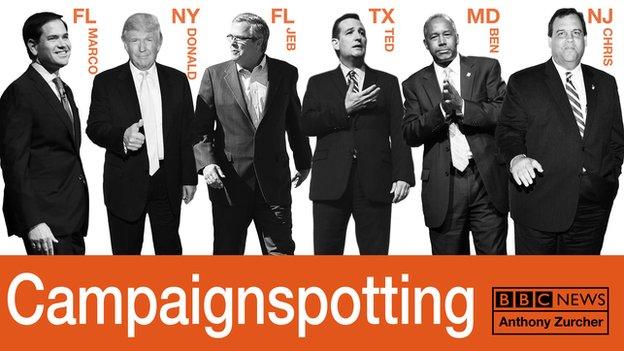
"If you need proof that Congress is a hostage to the gun lobby, look no further than today's vote blocking a bill to prevent known or suspected terrorists from buying guns and explosives," she said.
It didn't take long for the crowd of Republicans seeking their party's presidential nomination to condemn the effectiveness of such proposals, however.
"A free and armed American citizenry is how we keep ourselves safe," Texas Senator Ted Cruz said, external.
Former computing company executive Carly Fiorina called, external the watch-list issue a "red herring".
"My best friend's husband was on a watch list for years. It was a complete mistake," she said. "He also happened to be a gun owner. If I had utter faith in the competence of government, I might agree with that, but do you? I don't. The government screws up all the time."
Florida Senator Marco Rubio said, external the list "was not a perfect database".
"They shouldn't be used as a tool to impede 700,000 Americans or potential Americans - people on that list from having access to be able to fully utilise their Second Amendment rights," he continued.
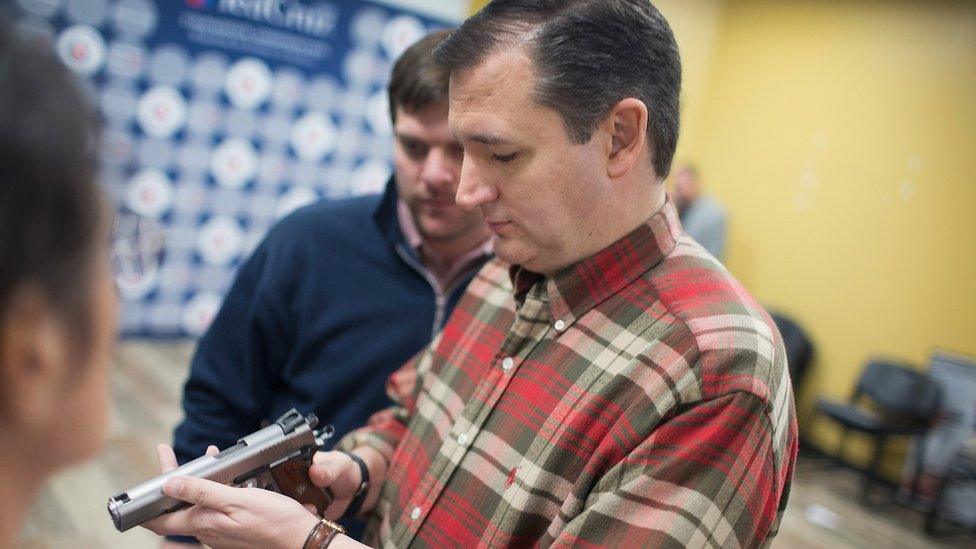
Ted Cruz says an armed US citizenry "keeps us safe"
According to, external the nonpartisan website Politifact, there may be 700,000 names on the watch list (the government doesn't provide such details), but the number of American citizens is likely around 10,000.
Ohio Governor John Kasich said relying on the list, even if it were effective, could present an intelligence risk.
"What we have to deal with is the fact that we don't want to tip somebody off that they're under review and that we could be gathering critical information to disrupt the plot," he said.
Billionaire businessman Donald Trump was alone among Republican candidates in expressing openness, external to such a move.
"I would certainly look at that very hard," he said.
Some conservative commentators were willing to consider the idea - up to a point.
"Let's first design a credible watch list, then we can discuss how to keep dangerous people from buying guns - without abandoning due process," writes, external David French in the National Review.
A standard liberal response is that such concerns are merely yet another cover for blocking rational attempts at gun control.
"Rather than throwing our hands up in the air and saying, 'Welp, guess it's better for some potential terrorists to have easy access to guns than to inconvenience anyone who wants a gun,' what about fixing the problems with the list - implementing an appeals process, for instance - and then using it as a tool to keep people who shouldn't have guns from getting guns?" writes, external Doktor Zoom on Wonkette.
The Washington Post's Eugene Volokh argues, external that even a more carefully curated watch list would pose serious legal concerns, however.
The right to own a firearm is protected in the Second Amendment to the US Constitution, and Ms Feinstein's Senate proposal - for instance - gives the US attorney general the power to take away that right based solely on a "reasonable belief" that the purchaser may use the weapon "in connection with terrorism".
President Obama outlines actions he thought ought to be taken to fight the evolving threat
"If you have a constitutional right to do something, the government has to do more than just provide the attorney general's suspicion and speculation as a basis for denying you that right," Volokh writes. "This isn't a supposedly modest, limited gun control measure. It cuts to the heart of the constitutional right itself."
Volokh's view highlights an irony that has emerged during the new debate over government watch lists. For years, such lists have been more sharply attacked from the left than the right.
In 2010, ACLU executive director Anthony D Romero called, external the watch lists "a mess".
The Intercept's Jeremy Scahill and Ryan Devereaux denounced, external what they view as a "confounding and convoluted system" for managing the watch list in a July 2014 article.
They obtained a secret government document detailing how federal officials compile the watch list and argued that the process is arbitrary, riddled with loopholes and largely free from substantive oversight.
"A broad definition of what constitutes terrorism and a low threshold for designating someone a terrorist," they write, "opens the way to ensnaring innocent people in secret government dragnets."
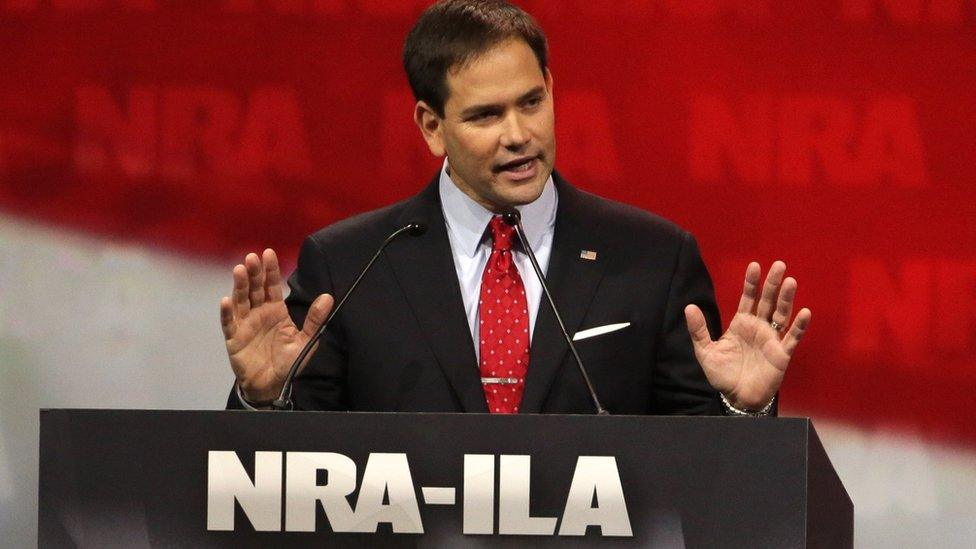
Florida Senator Marco Rubio says the US government terrorist watch list is 'not a perfect database'
The Guardian's Trevor Timm calls, external the no-fly list an "abomination" and says "it's shameful that the Democratic Party is not only defending it but trying to further legitimise and entrench it into America's laws".
"While there is some political usefulness in showing just how in bed the Republican Party is with gun lobbyists, using an awful tool like the no-fly list shouldn't be the way to do it," he writes.
Mr Obama's speech on Sunday night highlighted a change in the way Democrats are now framing the gun-control debate from one of crime prevention and safety to that of national security - perhaps in hopes of breaking a policy deadlock that has long seemed insurmountable.
Like many recent national security arguments, however, individual liberty and constitutional concerns stand in the way. This time, however, the political battle lines seem largely reversed.
- Published7 December 2015
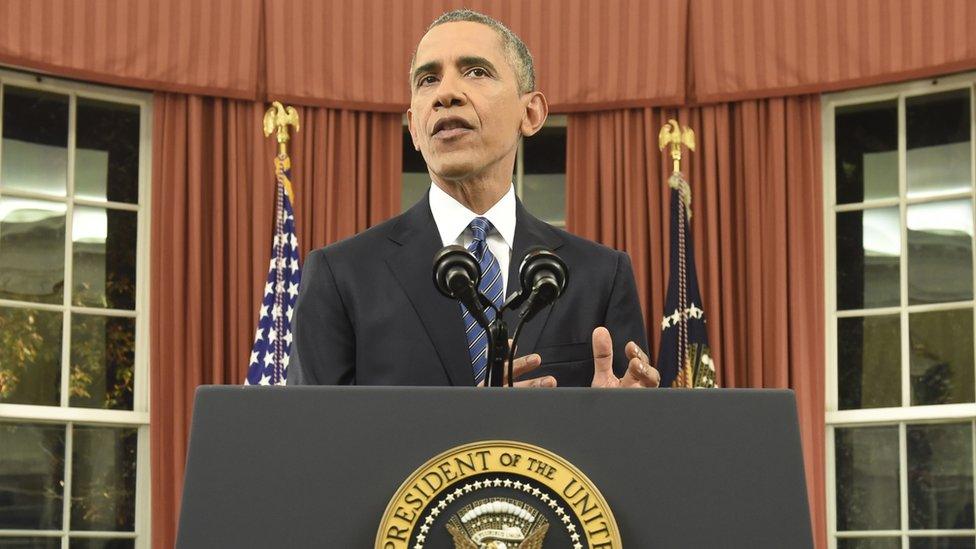
- Published16 November 2015